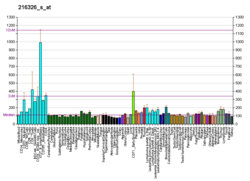HDAC3
n/a
Histone deacetylase 3 is an enzyme that in humans is encoded by the HDAC3 gene.
Histones play a critical role in transcriptional regulation, cell cycle progression, and developmental events. Histone acetylation/deacetylation alters chromosome structure and affects transcription factor access to DNA. The protein encoded by this gene belongs to the histone deacetylase/acuc/apha family. It has histone deacetylase activity and represses transcription when tethered to a promoter. It may participate in the regulation of transcription through its binding with the zinc-finger transcription factor YY1. This protein can also down-regulate p53 function and thus modulate cell growth and apoptosis. This gene is regarded as a potential tumor suppressor gene.
This enzyme is involved in the coordination of commensal-bacteria-dependent intestinal homeostasis when expressed in intestinal epithelial cells.
Histone deacetylases can be regulated by endogenous factors, dietary components, synthetic inhibitors and bacteria-derived signals. Studies in mice with a specific deletion of HDAC3 in intestinal epithelial cells (IECs) show a deregulated IEC’s gene expression. In these deletion-mutant mice, loss of Paneth cells, impaired IEC function and alterations in intestinal composition of commensal bacteria were observed. These negative effects were not observed in germ-free mice, indicating that the effects of the deletion are only seen in the presence of intestinal microbial colonization. But the negative effects of HDAC3 deletion are not due to the presence of an altered microbiota because normal germ-free mice colonized with the altered microbiota did not show the negative effects seen in deletion mutants.
...
Wikipedia

